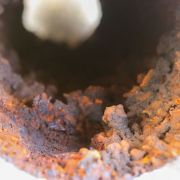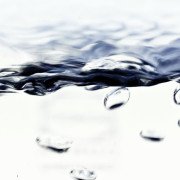Water Softeners – All About Water Softening
Water softeners are special pieces of equipment that help to soften water, and are especially useful in hard water areas. If you live in a hard water area and go on holiday to an area with softened water, you will notice a significant difference. Softened water makes it easier to shampoo your hair – with very little shampoo needed. It creates lots of bubbles in your bath, with very little bubble bath added. You’ll also notice far less scale in your kettle and in taps and pipework.
What Causes Hard Water?
The water we use will depend on the area we live in… for example, the water in the south-east of England has a high mineral content.
The higher mineral content is what makes water hard in the first place.
When rainwater falls in the south-east of England it eventually drains to pass through limestone and chalk found naturally in the ground.
As it drains through the limestone and chalk the water then soaks up some of the magnesium and calcium salts found in these rocks, and thus becomes harder than water you might find elsewhere in the country.
Head up to somewhere like Leeds however, and you’ll notice how much softer the water is there.
Many people living in the north of England have soft water… and again, the geology of the land will determine how hard or soft the water is in a particular area.
For example, in the Scottish Highlands, the rocks are not porous.
Instead they are very hard, which means the water does not take in as much in the way of minerals as it would in the south of England.
Using Water Softeners for Water Softening
It is however possible to soften a supply of water, given the right technology.
If your home or business is located in a hard water area installing an ion-exchange unit or water softener is the best course of action in this situation.
Essentially, water softeners remove the minerals that cause the water to become hard in the first place.
Ion-exchangers or water softeners work by using millions of resin beads.
Each bead of resin is able to attract the magnesium and calcium minerals that harden the water, thus removing them from the water itself.
This water softening process is typically completed before the water comes into the property that is using the ion-exchange unit.
Regeneration of Ion Exchange Resins
In order to get the most from the water softener or ion-exchange unit, the ion-exchange resin beads used in the softener need to be kept in good condition, and regenerated on a regular basis.
This leaves the resin beads ready to trap more minerals instead of becoming unable to do so.
Special regeneration salts are the best and most efficient way to remove the minerals from the resin beads as they do their job.
Removing Scale & Hardness Salts
Finally, it is worth noting that an ion-exchange unit or water softener can also gradually get rid of the scale that builds up over time in homes and businesses that receive hard water.
World Class Energy Management Solutions
Water Treatment Services are a leading independent UK water treatment, air, energy and environmental services company offering expert water management solutions including professional, water treatment, energy efficiency and support services.
With offices in London serving the South and South East England, Manchester (North West), Birmingham (Midlands), Bristol (South East England and Wales), Leeds (North and North East) and Glasgow (Scotland), supported by regional teams of specially trained engineers, site service specialists and technical experts we can offer water management solutions across the whole of the UK.
Contact us today to learn how our water management and engineering solutions can help you… contact us →
Further Reading…
More information about water softeners and water softening… here →











